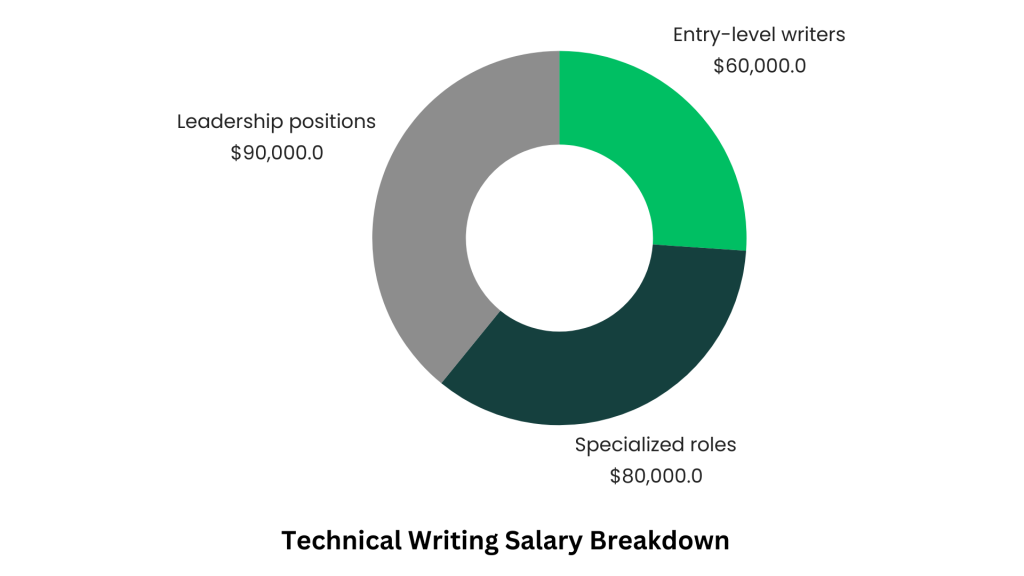
The technical writing industry has always been the basis of clear and concise communication within the technology sector. Today, the role of a technical writer has become pivotal. These professionals translate technical jargon and intricate product details into accessible documentation that can be understood by a wider audience.
As the industry evolves with new tools and methodologies, so does the demand for skilled writers who can keep pace with these changes. Salary trends provide a lens through which we can examine the industry’s health, the investment in these key communicators, and the market’s valuation of their contributions. In this blog, we will discuss the salary trends essential for career development, talent retention, and strategic planning, which are vital for aspiring technical writers, seasoned veterans, and the companies that employ them.
To better understand the current landscape, we can look back at some key insights from 2023, which offer a foundation for analyzing where the industry might be headed.
Basic Salary Trends from 2023
The year of 2023 has unveiled several compelling insights into the earnings of technical writers.
Average Salaries for Technical Writers in 2023
The average salary for technical writers in 2023 has seen a notable increase, reflecting the growing recognition of their expertise in the industry. When compared to data from 2021, there has been an average increase of 5%. This steady climb indicates the profession’s resilience and adaptability, even in the face of global economic fluctuations.
In 2023, technical writers have been reported to receive an average annual income of approximately $75,000. For example, answering the question ‘How much does a Technical Writer make?’ Salary.com provides the following information:
The average Technical Writer salary is $77,157 as of June 27, 2024, but the salary range typically falls between $69,458 and $86,315. Salary ranges can vary widely depending on many important factors, including education, certifications, additional skills, the number of years you have spent in your profession.
Those with over five years of experience are earning, on average, about $80,000 – $85,000. According to Squibler, the average pay of a Technical Writer with two to five years of experience is $78,099.
This upward trend is a testament to the expanding scope of technical writing and its importance in various sectors.
Regional Salary Variations
Regional disparities continue to play a significant role in salary differences. For example, according to Built in SF, technical writers in San Francisco report a median salary of around $105,000 due to the high concentration of tech companies and the cost of living. In contrast, those in the Midwest may see averages closer to $70,000, aligning with the regional economic scales and living expenses.
This information is important for both current and aspiring technical writers to understand their market value and for employers to ensure competitive compensation packages. While specific numbers may vary, the overall trend points to a healthy and growing field that values the expertise of its practitioners.
Factors Influencing Salaries
Salaries in the technical writing field are not uniform; they are influenced by various factors that can significantly affect compensation. Here is an overview of the primary elements that shape salaries:
- Education and professional certifications can profoundly impact a technical writer’s salary. For instance, those with advanced degrees in communication, English, or technical subjects often command higher starting salaries. Certifications like the Certified Professional Technical Communicator (CPTC) designation can also lead to salary premiums, as they demonstrate a commitment to the profession and mastery of industry standards.
- Experience is a key determinant of salary in technical writing. Entry-level writers may start with modest pay, but as they accumulate years of experience, their salaries typically increase proportionally. Senior technical writers or those with specialized knowledge in areas like API documentation can earn significantly more.
- The industry in which a technical writer works can greatly influence their salary. Writers in the software and aerospace industries, for example, tend to have higher average salaries compared to those in manufacturing or non-profit sectors.
These factors contribute to the diverse salary landscape of technical writing. By understanding these influences, technical writers can better negotiate salaries that reflect their value and expertise.
Salaries by Job Title
Below is a table that provides a comprehensive breakdown of salaries for different technical writing roles, along with an analysis of pay scales for entry-level versus senior positions.
| Job Title | Entry-Level Salary | Senior-Level Salary | Examples/ References |
| Technical Writer | $40,000 – $60,000 | $80,000 – $100,000 | An entry-level technical writer at a small to mid-sized tech company may start at $50,000, while a senior technical writer at a large corporation could earn up to $95,000. |
| API Documentation Writer | $70,000 – $90,000 | $100,000 – $120,000 | A senior API documentation writer at a major software company like Adobe may earn around $115,000. |
| Documentation Manager | $90,000 – $110,000 | $120,000 – $140,000 | Documentation managers at top-tier tech companies such as IBM can earn at the higher end of the scale, potentially exceeding $130,000. |
The salaries mentioned are based on general market trends and can vary widely depending on factors such as geographic location, industry demand, and company size.

Freelance vs. Full-Time Salaries
The compensation models for freelance and full-time technical writers differ significantly, and each has its own set of advantages and disadvantages.
Freelance technical writers typically charge by the hour or by the project. Hourly rates can range from $30 to $100 or more, depending on expertise and the complexity of the work. For example, a freelance technical writer with specialized skills in medical devices documentation might charge $90 per hour.
In contrast, full-time technical writers receive an annual salary, based on experience and role. A full-time senior technical writer in the same field could have an annual salary of $110,000.
Advantages and Disadvantages:
- Freelancing offers flexibility in choosing projects and the ability to work remotely. It can also lead to a higher income potential if the writer can secure consistent work. However, it comes with the uncertainty of income, the need for self-marketing, and the absence of employer-provided benefits.
- Full-time employment provides a stable income, benefits like health insurance and retirement plans, and opportunities for career progression within an organization.
Understanding these models can help technical writers choose the path that best suits their personal and professional goals.
Global Perspective
Technical writing salaries vary significantly from one country to another, reflecting the economic status, cost of living, and demand for technical expertise in each region. For example, technical writers in North America and Western Europe typically enjoy higher salaries compared to their counterparts in Asia and Eastern Europe. In the United States, the average technical writer’s salary ranges around $70,000, whereas in India, the average is approximately ₹500,000 (about $6,500).
Countries with a strong technological infrastructure and a high concentration of tech companies tend to offer better compensation. However, these figures are averages and can differ based on the factors previously mentioned, such as experience and specialization.
The rise of remote work has introduced a new dynamic to technical writing salaries. Companies are now able to tap into a global talent pool, leading to more competitive salaries in regions with lower living costs. Remote work also allows technical writers to seek employment opportunities with foreign companies that may offer higher pay than local markets. This has the potential to elevate the average salaries in regions where pay rates were traditionally lower.
Future Outlook
The field of technical writing is expected to evolve in the coming years, with salaries and roles being influenced by various factors.
The demand for technical writers is anticipated to grow, especially in technology sectors, healthcare, and engineering. As companies continue to value clear and concise documentation, the need for skilled writers is likely to increase. Correspondingly, salaries are expected to rise, with specialized roles such as API documentation writers and those with expertise in emerging technologies potentially seeing higher increases.
Emerging technologies like artificial intelligence, machine learning, and the Internet of Things (IoT) are creating new opportunities for technical writers. Writers who can adapt to these technologies and learn to document complex systems will be in high demand. The role of a technical writer may shift more towards information design and user experience, focusing on making complex information accessible to a broader audience.
Additionally, tools powered by AI could assist technical writers in creating more accurate and user-friendly documentation, potentially increasing productivity. However, writers will need to stay updated with these technologies to remain competitive in the job market.

Conclusion
Our survey has highlighted that technical writing is a lucrative and diverse field, with salaries varying widely based on factors such as experience, education, industry, and geographic location. Entry-level writers can expect to start at around $60,000, while those in specialized roles can command starting salaries of $80,000 or more. Leadership positions in documentation management can see salaries in the range of $90,000 to $110,000.
It has also revealed that continuous professional development, such as obtaining certifications and gaining expertise in high-demand areas like API documentation, can significantly boost a writer’s earning potential.
Salary surveys are an indispensable tool for career planning. They provide benchmarks that help technical writers assess their market value and make informed decisions about their career trajectory. By understanding the factors that influence salaries, writers can identify areas for growth and development, negotiate better compensation, and strategically plan their career advancement.
Good luck with your technical writing!
Author, host, and deliver documentation across platforms and devices.